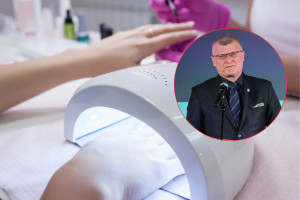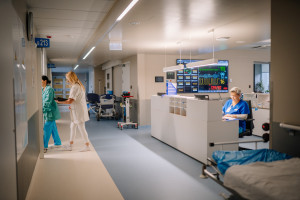Therapies save lives, but they destroy the body. About 20 percent of cancer patients die from exhaustion.

- Oncological therapies save lives, but at the same time they destroy the body. In Poland, about 20 percent of cancer patients die not because of the disease, but because of exhaustion, which is, among other things, a consequence of malnutrition.
- - An oncology patient undergoes radiotherapy and chemotherapy, which are very taxing for the body. During this time, they should be provided with meals with a much higher nutritional value than a healthy person - says Maciej Sikora
- Enteral nutrition for patients who cannot eat traditionally is a necessary procedure to keep them alive. Meanwhile, the National Health Fund pays on time only for part of the care provided to these people
As Maciej Sikora notes, oncological therapies save lives, but at the same time destroy the body.
- In Poland, about 20% of cancer patients die not from the disease, but from exhaustion, which is, among other things, a consequence of malnutrition. This is a huge systemic and educational problem that we must solve in cooperation between the Ministry of Health, the National Health Fund and hospital directors - says President Sikora, adding that malnourished patients stay in hospital twice as long as properly nourished ones, thus generating high costs.
- An oncology patient undergoes radiotherapy and chemotherapy, which are very taxing for the body. During this time, they should be provided with meals with a much higher nutritional value (rich in protein) than a healthy person who functions normally - says Maciej Sikora and draws attention to the situation of patients with cancer of the digestive tract, oral cavity, neck, who after several weeks of intensive therapy not only lose their appetite, but are unable to take food or even medicine.
- The patient has burns to his respiratory tract and upper digestive tract to the point that he cannot swallow. He is getting weaker day by day, his body cannot fight the disease, he does not respond to very expensive therapy, such as radiotherapy and chemotherapy. He is dying from exhaustion - explains our interlocutor.
Sometimes we are helplessAs Maciej Sikora notes, many patients come to nutritional centers by accident, many in a state of extreme malnutrition.
- They look terrifying, just skin and bones. We don't know if we can save them. I think to myself that if they had come to us a little earlier, we would have had a much better chance of saving them. Sometimes, however, we are helpless. That is why I strongly appeal for the introduction of a procedure enabling the inclusion of oncological patients in nutritional care as soon as possible, for example through an appropriate entry in the Diagnostic and Oncological Treatment Card (DiLO).
The President of the Organization for the Development and Treatment of Nutrition points out that the situation is further exacerbated by the complete lack of knowledge on this subject among primary care physicians who are entrusted with coordinated care for patients, including oncological patients.
No guarantee of payment- The procedures are ready, the knowledge is available. The only thing missing is the openness of the medical staff to education in the field of nutritional treatment - he assesses.
- Finally, I would like to mention the problem of financing medical nutrition facilities. Enteral nutrition for patients who cannot eat traditionally is a necessary procedure to keep them alive - he emphasizes. Meanwhile, the National Health Fund pays on time only for part of the care provided to these people.
- Patients who do not fit into the financial contract with the National Health Fund are not financed by the payer on an ongoing basis, which is why the service providers have to bear the costs, without a guarantee of payment by the National Health Fund - he says and explains that even if this payment takes place, it is with a huge delay.
- We don't know if and how much the National Health Fund will ultimately pay for their care. It came to a point where we were financing their stay from our own funds for a dozen or so months. For small service providers, with one or two contracts with the National Health Fund, this is a tragedy, because facilities of this profile have a legal obligation to accept every patient with a significant degree of disability. But how can we help them if we do not have guaranteed systematic financing of a previously known amount. I turn to the payer with this question - sums up Maciej Sikora.
rynekzdrowia











